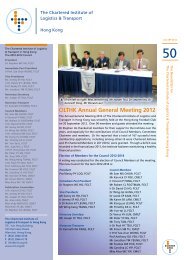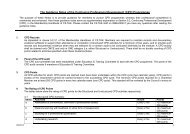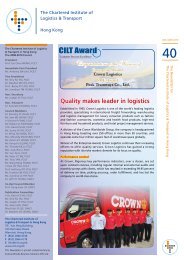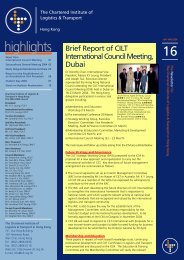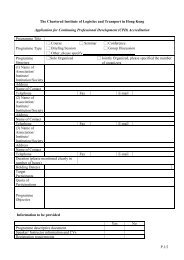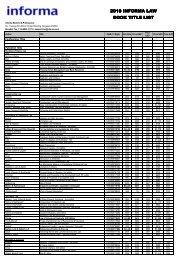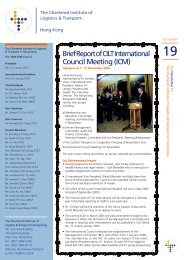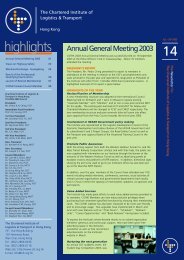CIT WORLD 8 TEMPLATE - The Chartered Institute of Logistics and ...
CIT WORLD 8 TEMPLATE - The Chartered Institute of Logistics and ...
CIT WORLD 8 TEMPLATE - The Chartered Institute of Logistics and ...
Create successful ePaper yourself
Turn your PDF publications into a flip-book with our unique Google optimized e-Paper software.
20<br />
CILTWorld issue 9<br />
NEWS FROM MEMBERS<br />
Cuba – taking things for granted<br />
How one <strong>Chartered</strong> member <strong>of</strong><br />
CILT felt he might have to go into<br />
‘James Bond mode’ to observe<br />
Havana’s overl<strong>and</strong> metro bus<br />
services – which operate with<br />
‘Camels’ ... but without route<br />
maps or timetables, <strong>and</strong> few bus<br />
stops!<br />
By Mike Taylor, CMILT *<br />
IN BRITAIN, we <strong>of</strong>ten take some <strong>of</strong> the simple<br />
things for granted. On a recent visit to Cuba I<br />
was quickly reminded <strong>of</strong> this. About a month<br />
before my departure from the UK I decided it<br />
would be nice, while on holiday to visit a couple<br />
<strong>of</strong> Cuba bus companies in order to have an<br />
informal meeting to compare bus-operating<br />
problems <strong>and</strong> to have the opportunity to take<br />
some photographs for my archive.<br />
Faxes were sent <strong>of</strong>f to three bus companies in<br />
Cuba, but after a week I had received no response<br />
from any <strong>of</strong> them. I repeated the exercise a second<br />
time, but still no response. A week before my<br />
departure to Havana I was disturbed by my<br />
secretary in a meeting to say the Cuban Public<br />
Relations Attaché In London wanted to speak to<br />
me urgently.<br />
<strong>The</strong> gentleman from the Embassy, although<br />
polite, was very assertive on the phone line: he<br />
had “heard” that I wanted to interview some bus<br />
managers. I had “only” a tourist visa <strong>and</strong> not a<br />
journalist visa, <strong>and</strong> such visits could not be<br />
permitted. Suddenly it appeared “big brother”<br />
was in a position to stop my holiday to Cuba. It<br />
was necessary for me to quickly backtrack, eat<br />
humble pie <strong>and</strong> to forego my harmless idea <strong>of</strong><br />
sharing bus operational experience with my<br />
Cuban peers.<br />
Attitudes change <strong>and</strong> finally the Attaché<br />
suggested that upon my arrival in Havana I<br />
presented myself to the “English Section” at the<br />
International Press <strong>of</strong>fice. This I duly did – <strong>and</strong> was<br />
met by a very helpful <strong>of</strong>ficial. Photographs <strong>and</strong><br />
forms were completed <strong>and</strong> exchanged, meetings<br />
would be arranged <strong>and</strong> a ‘minder’ would escort<br />
me on my visits.<br />
‘I felt I was moving into covert operations’<br />
However, after completing all these formalities I<br />
heard nothing more from the International Press<br />
Office about my proposed visits to the bus depots.<br />
As I had not been given any <strong>of</strong>ficial permission to<br />
make my visit I felt I was moving into covert<br />
operations in my observations <strong>of</strong> the public road<br />
passenger transport in Havana.<br />
<strong>The</strong> city has around two million residents, no metro<br />
<strong>and</strong> a relatively low car population. Personal<br />
mobility, therefore, is either by foot or by bus.<br />
Political <strong>and</strong> economic conditions have precluded<br />
any substantial investment in the city bus fleet.<br />
<strong>The</strong> municipal fleet appears to consist <strong>of</strong> Mercedes<br />
Benz <strong>and</strong> Volvo st<strong>and</strong>ard buses with Brazilian Buscar<br />
bodies painted in a dull blue <strong>and</strong> white livery. <strong>The</strong>se<br />
appear to have been supplemented by a number <strong>of</strong><br />
Dutch Den Oudsten Dafs, still in their original<br />
liveries.<br />
Among those interested in transport, Havana has<br />
become famous for its substitute overl<strong>and</strong> metro<br />
bus services. Known as “Camels” – because <strong>of</strong> their<br />
two humps – these are principally converted<br />
articulated lorries (see picture above). <strong>The</strong>se were<br />
introduced in 1995 on around ten major corridor<br />
routes radiating out from the city centre. <strong>The</strong> routes<br />
have to be planned carefully due to the physical size<br />
<strong>and</strong> manoeuvrability <strong>of</strong> these huge “truck buses”,<br />
which are around 75ft (23 metres) long – compared<br />
with 60ft (18 metres) for a typical articulated bus.<br />
Each route has a prefix letter “M” followed by a<br />
designated numerical number. To add further<br />
distinction, each route has a specific allocation <strong>of</strong><br />
“Camels” <strong>and</strong> they are painted in very bright pastel<br />
colours dedicated to that route.<br />
Carrying up to 300 passengers, these vehicles are<br />
clearly prime movers as, having observed them<br />
during the day, they always appeared to be full.<br />
Ultimate secrecy<br />
<strong>The</strong> secrecy in Cuban life seems to extend to the<br />
ultimate. <strong>The</strong>re appear to be no <strong>of</strong>ficial bus route<br />
maps or printed timetables for any <strong>of</strong> the bus<br />
services to assist Havana’s two million citizens.<br />
That may not be too surprising, as many capitals<br />
in developing countries have limited budgets –<br />
but Cuba has around two million overseas<br />
visitors a year, <strong>and</strong> nearly all <strong>of</strong> them spend time<br />
in Havana.<br />
What is even more problematic is that bus stops<br />
are almost non existent in the city. Your only clue is<br />
a line <strong>of</strong> waiting people. However, you have no<br />
idea what bus they are waiting for, where that bus<br />
may be going or when it is supposed to turn up!<br />
<strong>The</strong> social convention, I believe, is to ask (if you<br />
can speak Spanish) the last person you think is in<br />
the queue if they are “in” the queue.<br />
Despite this, my English-speaking hotel<br />
receptionist told me that queue jumping in<br />
Havana is very much considered as being antisocial<br />
– unlike my earlier experiences in Central<br />
<strong>and</strong> Southern America.<br />
Having made this report, nevertheless I would<br />
recommend anybody to visit Cuba. It is a warm,<br />
friendly <strong>and</strong> casual country with a wonderful road<br />
passenger system that has a particularly Cuban<br />
approach to a particularly Cuban problem.<br />
• Mike Taylor is Principal Lecturer in Travel<br />
Marketing at the School <strong>of</strong> Services Management,<br />
University <strong>of</strong> Brighton, Sussex, UK.



